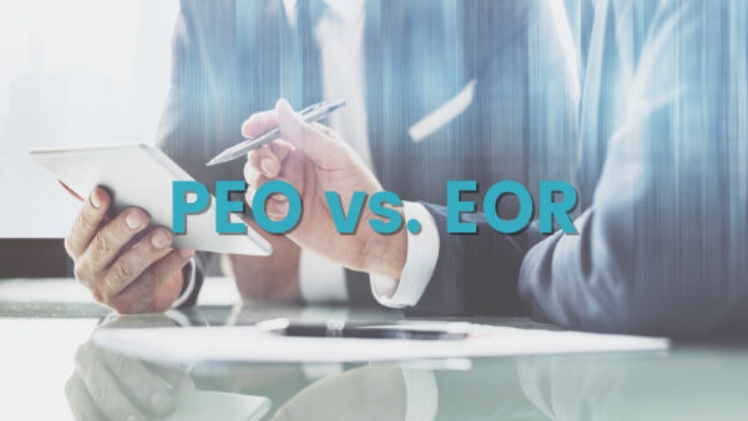PEOs serve 173,000 small and medium-sized companies and remote workers that employ 4 million people.
If you’re looking into PEOs, you may also be aware of EOR. But many people are not sure what the differences are between PEO and EOR, so are not sure which one your business needs.
Deciding on which type of employee leasing to choose for your business can be difficult. There are a lot of factors to consider, and it’s hard to know who to trust.
Keep reading because we understand that making the right decision for your business is important. That’s why we’ve created this article to outline the differences between PEO and EOR. By the end, you’ll have a better idea of which one is right for you.
What Is PEO?
Professional Employer Organizations, or PEOs, are companies that provide HR outsourcing services to small and medium-sized businesses. A PEO becomes the employer of record for its clients’ employees, taking on the responsibilities of managing payroll, benefits, and other HR functions. This allows businesses to focus on their core competencies and gives them access to the expertise and resources of a larger organization.
PEOs can also help businesses to reduce their costs and improve their compliance with employment international law. As a result, PEOs are an increasingly popular option for businesses looking to outsource their HR functions. If you’re looking for a PEO, check out this company.
What Is EOR?
EOR stands for Employment Outsourcing Provider, and it is a type of company that provides HR outsourcing services to businesses. An EOR is similar to a PEO in that it can help businesses with tasks such as payroll and benefits administration. However, there are some key differences between the two types of companies. For example, an EOR typically does not assume liability for its clients’ employees, whereas a PEO does.
An EOR also usually does not provide workers’ compensation insurance or payroll taxes, both of which are typically provided by a PEO. As a result, each type of company has its own unique set of advantages and disadvantages. When choosing an HR outsourcing provider, it is important to carefully weigh all of the options to find the best fit for your business.
Differences Between PEOs and EORs
Now that you know a little bit about both PEOs and EORs, let’s take a look at some of the key differences between the two. The difference includes:
Services Offered
One of the biggest differences between PEOs and EORs is the range of services they offer. PEOs typically offer a comprehensive suite of HR services, including payroll, benefits administration, workers’ compensation, risk management, and more.
EORs, on the other hand, tend to specialize in one or two areas of HR, such as payroll or benefits administration. While an EOR may offer a few additional HR services, its focus is usually narrower than that of a PEO.
Pricing
PEOs and EORs differ in a number of ways, but one of the most significant is pricing. PEOs typically charge higher fees than EORs because they offer a wider range of HR services. This includes things like payroll and benefits administration, as well as compliance and risk management. While PEOs can save businesses money in the long run, their upfront costs can be prohibitive for some companies.
EORs, on the other hand, tend to be more affordable, making them a better option for businesses that are on a tight budget. Of course, this doesn’t mean that EORs are always cheaper – it all depends on the specific services you need. But in general, EORs are a more affordable option for small businesses.
Client Relationship
The relationship between a PEO and its clients is also different from the relationship between an EOR and its clients. When you partner with a PEO, you’re entering into a co-employer relationship. This means that the PEO becomes the employer of record for your employees. The PEO then assumes many of the responsibilities that come along with being an employer, such as paying taxes and complying with employment laws.
EORs, on the other hand, do not become the employer of record for their clients’ employees. The client remains the employer of record, and the EOR simply provides HR outsourcing services.
Employees
Another key difference between PEOs and EORs is the way they treat their employees. PEOs consider their clients’ employees to be part of their own workforce. This means that PEO employees are eligible for the same benefits and perks as regular PEO employees, such as health insurance and retirement plans.
EORs do not consider their clients’ employees to be part of their workforce. This means that EOR employees are not eligible for the same benefits and perks as regular EOR employees.
Regulatory Compliance
PEOs and EORs also differ in the way they handle regulatory compliance. PEOs are typically responsible for ensuring that their clients’ businesses are compliant with all applicable employment laws.
EORs, on the other hand, typically do not assume responsibility for their clients’ compliance with employment laws. Instead, they typically provide their clients with guidance and resources to help them stay compliant.
So, Which Is Right for Your Business?
PEOs and EORs both have their pros and cons. The best way to decide which type of company is right for your business is to sit down and assess your needs. Do you need a comprehensive suite of HR services? If so, a PEO might be a good fit for you. Or do you need help with just one or two HR functions? If so, an EOR might be a better option.
Want more articles like this? Check out our blog for more in-depth comparisons and case studies.

